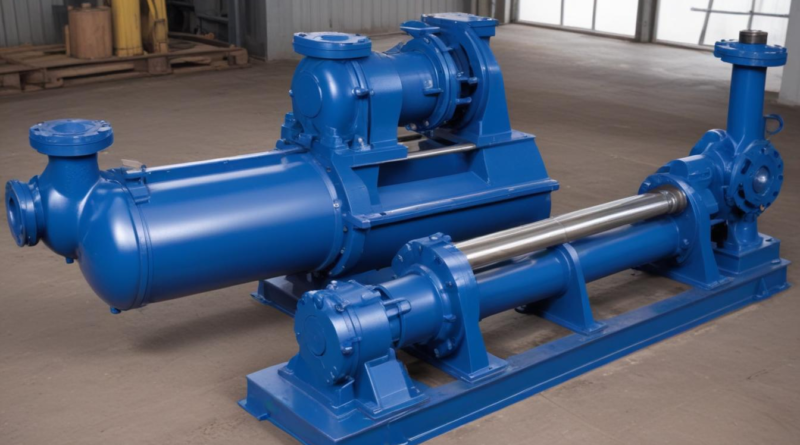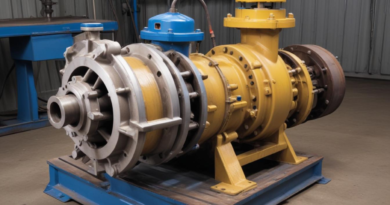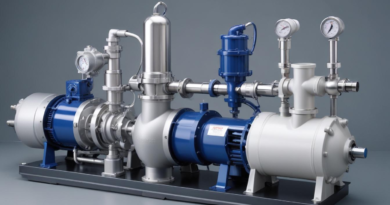Why progressive cavity pumps excel in handling solids
Progressive cavity pumps are unique in their design, allowing them to excel in the challenging task of handling solids in various applications. Unlike traditional pumps, which may become clogged or damaged when dealing with solid materials, progressive cavity pumps utilize a helical rotor and stator configuration to continuously and gently transport fluids mixed with solids. This design minimizes shear and turbulence, protecting the integrity of both the pump and the materials being transferred.
The inherent ability of progressive cavity pumps to manage a wide range of viscosities and maintain a consistent flow rate is a significant advantage when handling solids. They can pump thick slurries, paste-like substances, and even large solid particles without compromising performance. Key benefits of these pumps include:
- Continuous, non-pulsating flow, which reduces wear and tear on the pump.
- Ability to handle high-viscosity materials effectively.
- Low internal shear, ensuring the product quality is maintained.
- Versatile application in both industrial and residential settings.
- Robust construction that allows for durability and reliability in demanding environments.
In industries such as wastewater treatment, food processing, and mining, the superior solids handling capabilities of progressive cavity pumps prove invaluable. Their robust design and adaptability make them a preferred choice for applications where traditional pumps falter. By ensuring that equipment can effectively manage solids, companies can improve operational efficiency and reduce downtime caused by blockages or equipment failures.
The unique features of progressive cavity pumps not only enhance their effectiveness in solids handling but also lead to significant operational advantages, thus reinforcing their role as a vital component in many engineering applications.
Understanding Progressive Cavity Pumps
Progressive cavity pumps operate based on a simple yet effective mechanism that allows for the reliable transportation of fluids containing solids. The primary components of these pumps include a single helical rotor that rotates within a double helical stator. This design creates a series of sealed cavities that move the fluid through the pump without causing turbulence or shear forces that could damage or alter the solids being transported.
This rotary motion ensures a smooth and continuous flow, making progressive cavity pumps ideal for solids handling in various applications, including those involving abrasive or viscous materials. The simplicity of their design translates into fewer moving parts, which contributes to lower maintenance requirements and increased operational lifespan.
Understanding the operational dynamics of progressive cavity pumps is essential for engineers and pump users. Key features include:
- Consistent Flow Rate: These pumps maintain a steady flow, which is crucial for applications requiring precise volume transfer, particularly when dealing with slurries or pulpy materials.
- Self-Priming Capability: Progressive cavity pumps can handle low-viscosity entries while effectively managing solids in the mix without losing suction or prime.
- Versatility: Suitable for various fluid types, from less viscous liquids to thick sludges containing solid particles, making them adaptable to a multitude of processes.
- Low Shear Rates: The gentle pumping action minimizes the impact on solids, maintaining their integrity during transfer, which is critical in applications like food processing and pharmaceuticals.
In sectors where fluid handling requires the management of solids, understanding the mechanics behind progressive cavity pumps allows for better application and utilization. Their efficiency in delivering consistent performance leads to significant benefits in operational processes, ensuring reduced downtime associated with blockage and equipment failure.
Furthermore, the ability to configure the pump with various materials and designs means that they can be tailored to suit specific requirements in industrial settings, enhancing both productivity and reliability.
Key Benefits of Handling Solids
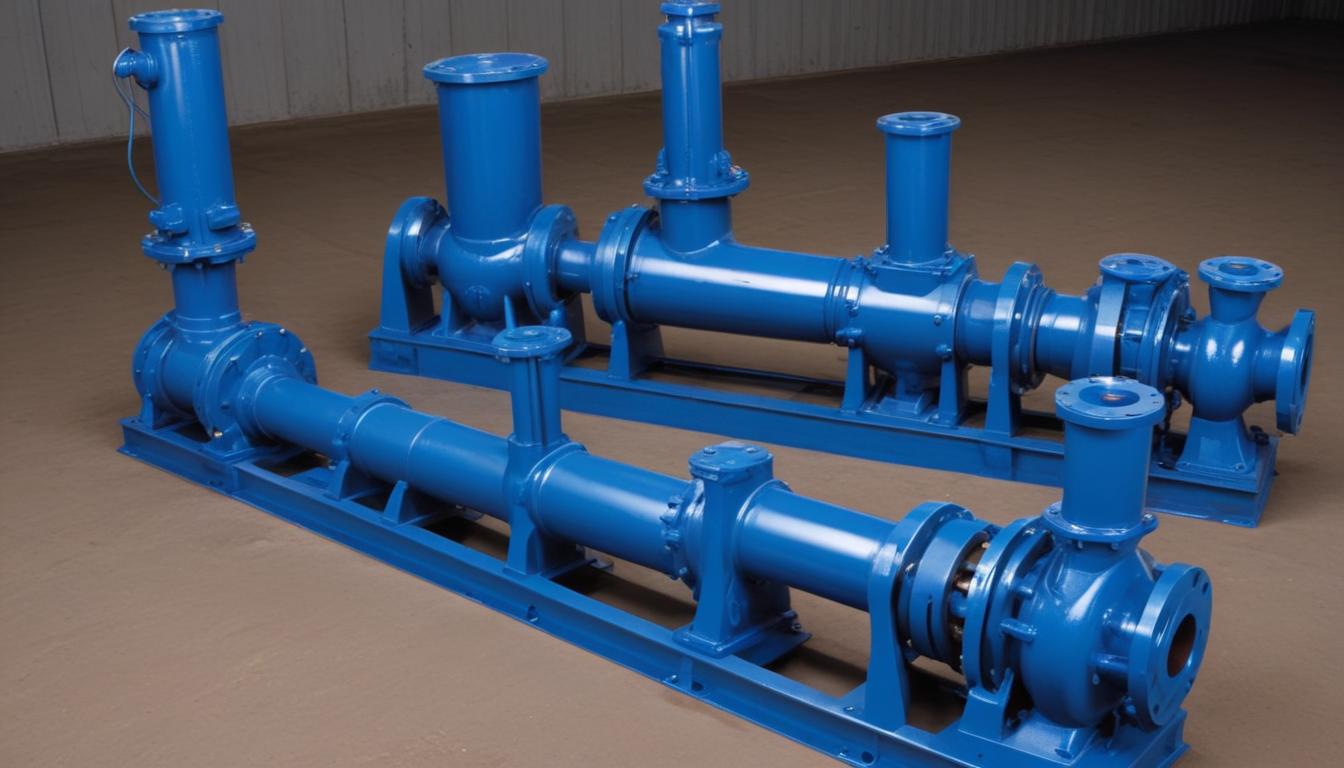
The ability of progressive cavity pumps to handle solids presents numerous benefits that enhance operational efficiency and reliability across various industries. One of the most significant advantages is their capability to transport fluids with varying solid content without damaging the solids themselves or risking pump integrity. This characteristic is crucial in processes where product quality is paramount, such as in food and beverage manufacturing, as well as in pharmaceuticals.
Moreover, their ability to provide a continuous flow reduces the likelihood of system shock and pressure surges, which can occur with pulsating flow pumps. This continuous delivery minimizes wear on components, thus extending the life of the pump and reducing maintenance costs. Additionally, the gentle nature of the pumping action protects sensitive solids, allowing for the transportation of fragile materials without causing degradation or alteration.
Another key benefit of progressive cavity pumps is their high viscosity handling capability. They efficiently manage thick slurries and mixtures that traditional pumps often struggle with. This flexibility not only broadens their application scope but also ensures that operations can be adapted to changing material characteristics without the need for extensive equipment modifications.
Progressive cavity pumps exhibit exceptional versatility in their operational settings. They can be utilized in a wide range of applications, including:
- Wastewater Treatment: Effectively handling solids in wastewater sludge.
- Food Processing: Transporting thick mixtures, slurries, and pastes while maintaining product integrity.
- Mining: Moving abrasive slurries containing minerals and larger particulates without clogging.
- Chemical Processing: Managing corrosive fluids mixed with solids, ensuring equipment longevity.
In addition to these operational benefits, the robust design of progressive cavity pumps ensures reliability even in demanding environments. Their construction is capable of withstanding harsh conditions, which is a significant consideration for industries that experience extreme temperatures, pressures, or corrosive materials.
Adopting progressive cavity pumps leads to improved process efficiency. By minimizing downtime due to blockages and enhancing the longevity of the equipment, these pumps contribute to a more streamlined workflow. This reliability and efficiency are critical for competitive industries where time and resources directly impact profitability.
Applications in Various Industries
Progressive cavity pumps are increasingly recognized for their effectiveness in various industrial applications, particularly those involving solids handling. Their unique design allows these pumps to adapt seamlessly to the specific requirements of different industries, making them invaluable assets in operations that deal with challenging materials.
In the wastewater treatment sector, progressive cavity pumps excel at transporting sludge and thick mixtures laden with solids. Their ability to handle abrasive particles without clogging or damaging internal components enhances operational reliability, reducing maintenance costs and downtime associated with equipment blockages.
Within food processing, these pumps are used to move viscous substances such as thick pastes and slurries while ensuring product integrity. The low shear rate of progressive cavity pumps is particularly beneficial in maintaining the quality of sensitive food materials, preventing degradation and preserving texture and flavor throughout the transfer process.
In the mining industry, progressive cavity pumps effectively transport abrasive slurries containing minerals and larger particulates. Their robust construction allows them to withstand harsh conditions, ensuring longevity and reliability even in challenging environments. This capability is crucial for maintaining productivity in operations where the risk of pump failure could lead to severe operational interruptions.
In chemical processing, these pumps are adept at managing corrosive materials mixed with solids, which is essential for maintaining system integrity and worker safety. By utilizing materials resistant to chemical degradation, progressive cavity pumps can handle complex mixtures, thus expanding their applicability in this sector.
Other applications of progressive cavity pumps include biopharmaceuticals, where gentle handling is necessary to preserve the integrity of biological materials, and paper and pulp industries, where managing slurries is a routine necessity. The versatility of these pumps makes them a preferred choice across various domains, showcasing their ability to meet diverse operational needs efficiently.
The integration of progressive cavity pumps within industrial processes not only enhances the ability to handle solids effectively but also leads to improved overall operational efficiency. Their durability, coupled with the continuous and gentle flow they provide, makes them an essential component in maintaining the rhythm of many industrial operations.
Comparing with Other Pump Technologies
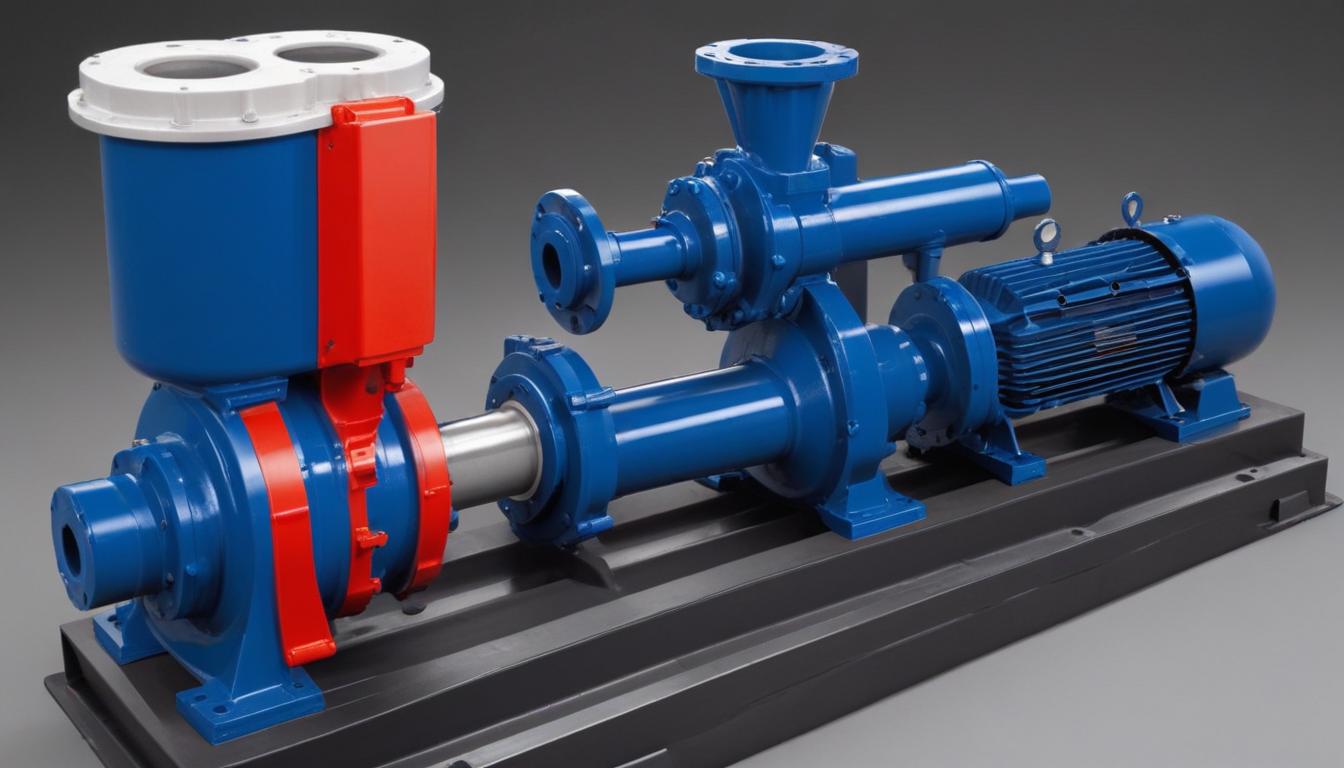
When comparing progressive cavity pumps with other pump technologies, several factors come into play that highlight the distinct advantages offered by these pumps in the realm of solids handling. Traditional pump designs, such as centrifugal and diaphragm pumps, often face significant limitations when it comes to handling solid-laden fluids. In contrast, progressive cavity pumps are engineered to handle a broader range of materials with varying solid contents effectively.
One of the primary differentiators is the mechanical design. Progressive cavity pumps utilize a helical rotor inside a double helical stator, which creates a series of sealed cavities that maintain continuous flow without subjecting the mixture to turbulence. This design prevents the clogging issues common with centrifugal pumps, which rely on high speeds and centrifugal force to move fluids. As a result, progressive cavity pumps minimize the risk of blockages when dealing with viscous slurries or large solid particles, ensuring smoother operations even in challenging environments.
Another significant advantage of progressive cavity pumps is their ability to manage low flow rates while still handling substantial solid content. Compared to diaphragm pumps, which can struggle with consistency and can easily suffer from wear and tear due to alternating pressure cycles, progressive cavity pumps deliver a steady and consistent flow, reducing wear on both the pump and the materials being transported. This aspect is crucial in applications where maintaining fluid quality is paramount.
The operational versatility offered by progressive cavity pumps further enhances their appeal. Unlike some pump types restricted to specific mediums or viscosity ranges, progressive cavity pumps can adapt to various fluid characteristics, making them suitable for applications across sectors like wastewater treatment, food processing, and chemicals. This adaptability means fewer equipment changes are necessary as material characteristics evolve, translating into better process efficiency and cost-savings.
Maintenance and longevity are also critical considerations when comparing technologies. While all pumps require maintenance, the fewer moving parts of progressive cavity pumps generally result in lower maintenance demands. Their robust construction allows them to withstand abrasive materials and harsh conditions, thereby extending life cycles when compared to traditional centrifugal or diaphragm pumps which may degrade more quickly under the same stresses.
In terms of fluid compatibility, progressive cavity pumps can handle a wider spectrum of materials, including corrosive or abrasive substances, without compromising performance, unlike some of their competitors. This is particularly beneficial in industries like mining where slurries containing minerals pose serious risks to pump integrity.
While other pumping technologies may perform effectively under specific circumstances, the advantages offered by progressive cavity pumps in solids handling present a compelling case for their selection in a range of applications. Their design tailored for consistent, gentle transport of solids not only prevents damage to the materials and the pump but ultimately contributes to enhanced operational efficiency and reduced downtime, ensuring a more reliable process.
Maintenance and Operational Considerations
Maintaining and operating progressive cavity pumps involves a set of considerations that are critical for ensuring optimal performance, particularly when handling solids. Understanding these aspects can significantly enhance the lifespan of the pump and the efficiency of the overall system.
One of the foremost maintenance considerations is the regular inspection of the pump’s components. Given their unique construction, progressive cavity pumps have fewer moving parts compared to other types of pumps, which can reduce maintenance frequency. Nonetheless, components such as the rotor and stator must be monitored for wear, as damage to these parts can lead to inefficient operation or even failure. Scheduling routine maintenance checks is essential for identifying potential issues before they escalate.
Furthermore, lubrication is a crucial element in the maintenance process. Proper lubrication of the pump’s moving parts minimizes friction and wear, leading to smoother operation and prolonged lifespan. Users should refer to the manufacturer’s guidelines regarding the appropriate type and frequency of lubrication, as this can vary based on the specific application and operational conditions.
Another vital aspect of maintaining progressive cavity pumps is ensuring proper fluid viscosity. These pumps are designed to handle a wide range of viscosities; however, extreme conditions beyond the recommended limits can lead to operational difficulties or pump damage. Maintaining the fluid within the specified viscosity range will ensure optimal performance and reduce the risk of clogs or other issues during solids handling.
Operational considerations also play a key role in the effectiveness of progressive cavity pumps. The pump should be operated under conditions that align with its design specifications, including pressure and temperature limits. This consistency not only enhances the usability of the pump but also contributes to its efficiency when processing materials with a solid content.
User training is equally important. Proper training ensures that operators understand the capabilities and limitations of progressive cavity pumps, allowing them to implement best practices in both operation and maintenance. Awareness of the importance of air management is crucial, as air entrapment can lead to cavitation and affect the performance of the pump. Ensuring that the system is properly vented and primed is necessary to maintain optimal flow rates.
In addition, facilitating cleaning routines is imperative when handling solids. Accumulation of residual materials can impact the functionality and performance of the pump. Implementing a standardized cleaning protocol after periods of operation will help prevent build-up and maintain the reliability of the pump.
Lastly, keeping a close watch on the operational data—such as flow rates, pressures, and temperature readings—can provide insights into the pump’s performance and highlight any abnormalities that may indicate maintenance needs. Regular monitoring aids in the early detection of issues, facilitating timely interventions that can prevent more extensive and costly repairs.
By considering these maintenance and operational aspects, users can significantly enhance the performance of progressive cavity pumps while effectively managing solids handling in various industrial applications. Proper care and attention lead not only to improved efficiency but also extend the overall lifespan of the equipment, maximizing the benefits these pumps offer in numerous operational settings.

